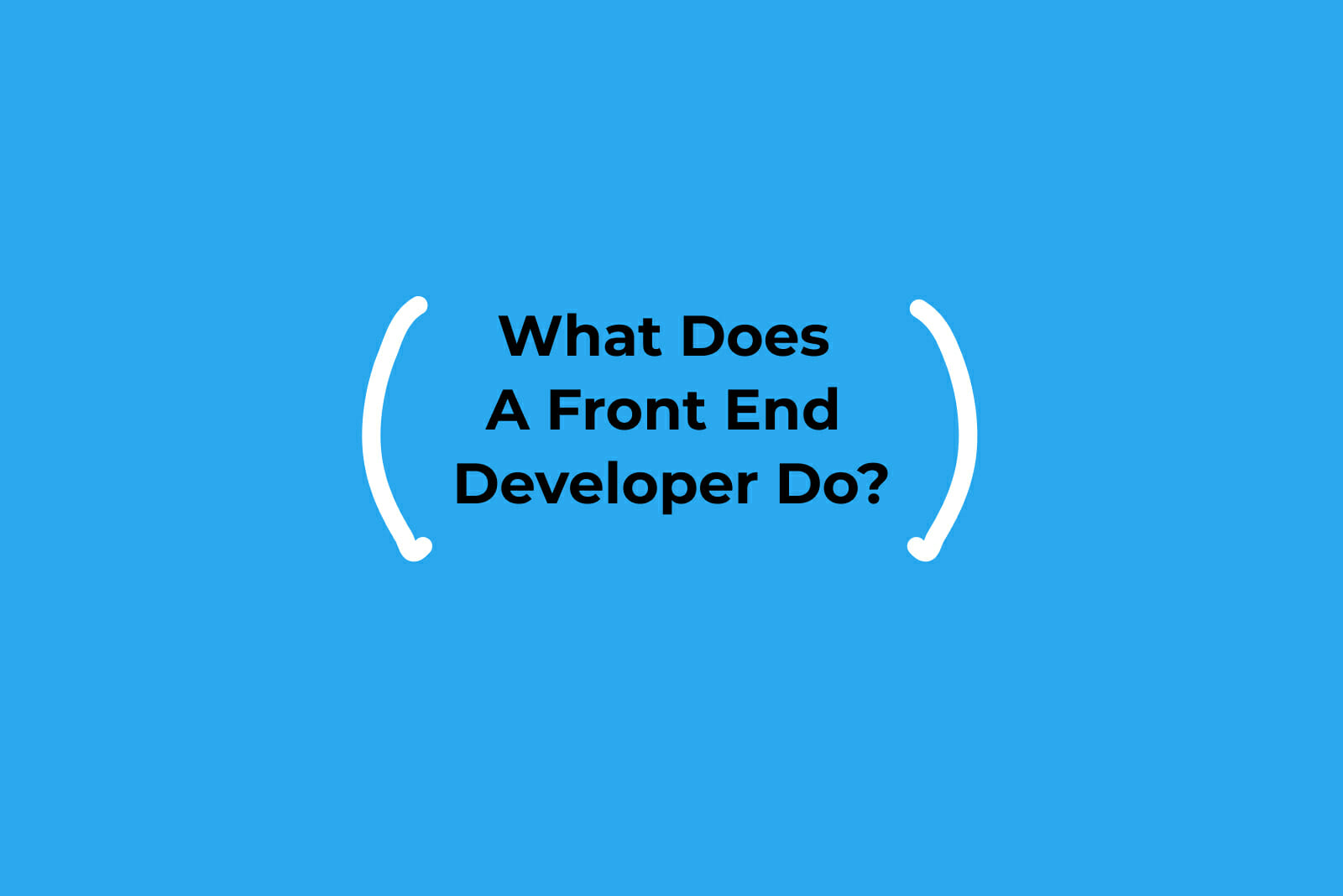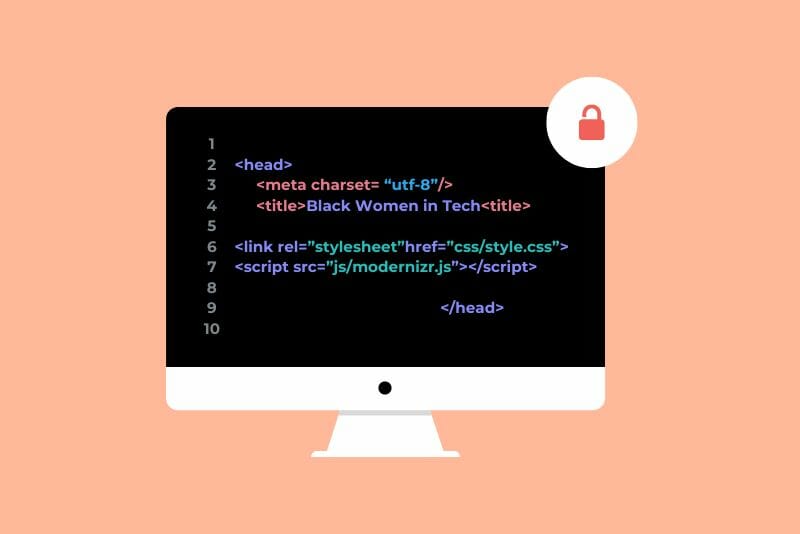How Long Does it Take to Become a Web Developer?
A lot less time than you might think.

With 56,000 web development jobs listed on Glassdoor as of this writing and an average base pay of $68,524 a year (across all levels, entry-level to senior), it’s clear job opportunities for web developers are plentiful and lucrative, even during a pandemic. More specifically, front end developer jobs (jobs using code to build the visible parts of a website) have a base pay of $109,479 in the United States.
But…are web development jobs a good entry point into tech? How long does it take to learn how to code? And how long does it to take to become a web developer?

The answers might surprise you. Not only are front end web developer jobs in particular a perfect way to start a tech career, it’s possible to start making money with front end development skills in a matter of months.
How Long Does It Take to Make The First Steps?
While it might not take as long as you think to become a front end developer, there are still a few phases involved. So what are the first steps and how long do they take?
The absolute first step toward web development is to start learning two coding languages ASAP — HTML and CSS. HTML and CSS are markup languages used to define the parts of a web page (HTML) and determine the page’s fonts, colors and layout (CSS). These two skills will allow you to start building basic websites, and they’ll even qualify you to start doing paid HTML and CSS jobs (think freelance web development gigs for friends, family, or local businesses). And here’s the thing — learning to code with HTML and CSS can take as little as weeks or even days depending on your pace and approach.
After getting experience with HTML and CSS, you can expand your development repertoire further with programming languages like JavaScript — a scripting language that controls dynamic website content (e.g. animated graphics and interactive maps). Learning JavaScript will add a few more months to your learning process, but knowing JavaScript will also open up even more development jobs.
Once you’ve nailed the basics of these front end development skills the learning process will continue over the course of your development career — and there are always more skills to learn in order to stay professionally flexible and relevant. For instance if you’re interested in exploring back-end web development (web development focused on the “under the hood” aspect of websites like database management) you’ll need to learn server side languages like Ruby on Rails. That said, the process of becoming a professionally viable front end developer can realistically be achieved in a matter of months.
Can You Learn Coding From Home or Does This Mean Going Back to School — and Does Either Approach Affect Your Timeframe?
Front end web development is a skill-based job — a bachelor’s degree, associate’s degree, or other credentials are less of an issue when it comes to employment than simply having the right skills. Can you get a job as a front end web developer if you have a degree in computer science? Of course you can — as long as you have front end web developer skills. And if you have those skills without a computer science degree, you’ll be just as qualified for development jobs.
With this in mind, going back to traditional college to become a front end developer doesn’t make sense — it adds years and thousands of dollars to a process that can be completed in a fraction of the time and for a fraction of the cost. Instead, more realistic paths to learning front end development skills include teaching yourself through free online coding tutorials, paying for instructor-led classes online, and attending in-person code bootcamps.
But what differentiates each of these approaches? And how does each approach affect your learning time frame?
Code bootcamps are coding schools that usually offer in-person immersive 8-12 week long courses — which right off the bat answers questions about time. Due to Covid, they are mainly online now, but may still adhere to the usual timeframes and workloads. Bootcamp programs are designed to have students code-ready by the end of their prescribed length, so if you attend a 12-week course it should take you about 12 weeks to be ready for development work.
That probably sounds better than spending two-to-four years getting a traditional degree, but code bootcamps aren’t without their own challenges. Since bootcamps traditionally take place at in-person locations, you’ll need to move to that area if you don’t already live close by. Meanwhile, because of the intensive nature of code bootcamps, you won’t be able to work or generate income during the 8–12 weeks you’re enrolled (meaning you’ll need to have all your living expenses covered up front). And finally, bootcamps are a particularly expensive way to learn how to code — bootcamp tuition averages $11,451 (above and beyond any related living or relocation costs).
📌 Related: Job Placement Rates: What You Need to Know Before You Enroll in a Bootcamp
If those kind of expenses are beyond your reach, you can go the other end of the cost spectrum and teach yourself programming languages through free online tutorial sites like Coursera and Free Code Camp. These sites — as well as online development forums like GitHub and Stack Overflow — offer enough basic information (for free!) to get you started with HTML, CSS, and JavaScript.
However, with this approach the issue of time can get murky. Since there are no set guidelines when teaching yourself, the length of learning time depends entirely on you. Your time frame will also be significantly affected by the quality of the resources you happen to find and whether or not your learning style is conducive to self-direction — free coding classes might not work for everyone.
📌 Related: Should You Pay to Learn to Code?
Finally, paid online coding classes are a middle ground between the expenses of a code bootcamp and the nebulous path of teaching yourself. Online coding schools give you the flexibility to learn from home and set your own pace, but you’ll still receive peer and instructor support while you learn. While online code schools usually don’t operate on exact time frames like in-person bootcamps, they still offer guidelines and structure that isn’t there if you try to teach yourself.
For instance, the Skillcrush Break Into Tech Blueprint (covering HTML, CSS, and JavaScript, as well as web design skills, WordPress, and more) is designed to be completed in 9–12 months if students devote about an hour a day — which allows you to take more or less time to complete the program based on your unique situation and needs. The program is also designed for you to start freelancing while you’re still learning. This means building an entire tech toolkit (including moving past the basics) is still totally achievable in less than a year.
No, You’re Not Too Old to Become a Web Developer
Tech-curious job seekers of all ages consistently wonder whether or not they’re too old to learn programming languages and make a career change — and if it’s simply too late to start. The very easy answer is…No!
Doubling back to the idea that front end web development is a skill-based job, this applies as much to your age as it does to your education background — if you have the skills, they will pay the bills. And because the time investment to learn front end development skills is such a relatively small one, there’s no time like the present to get started. You’ve probably spent more time wondering if you can do it than it will actually take you to learn the basic skills.
📌 Related:





